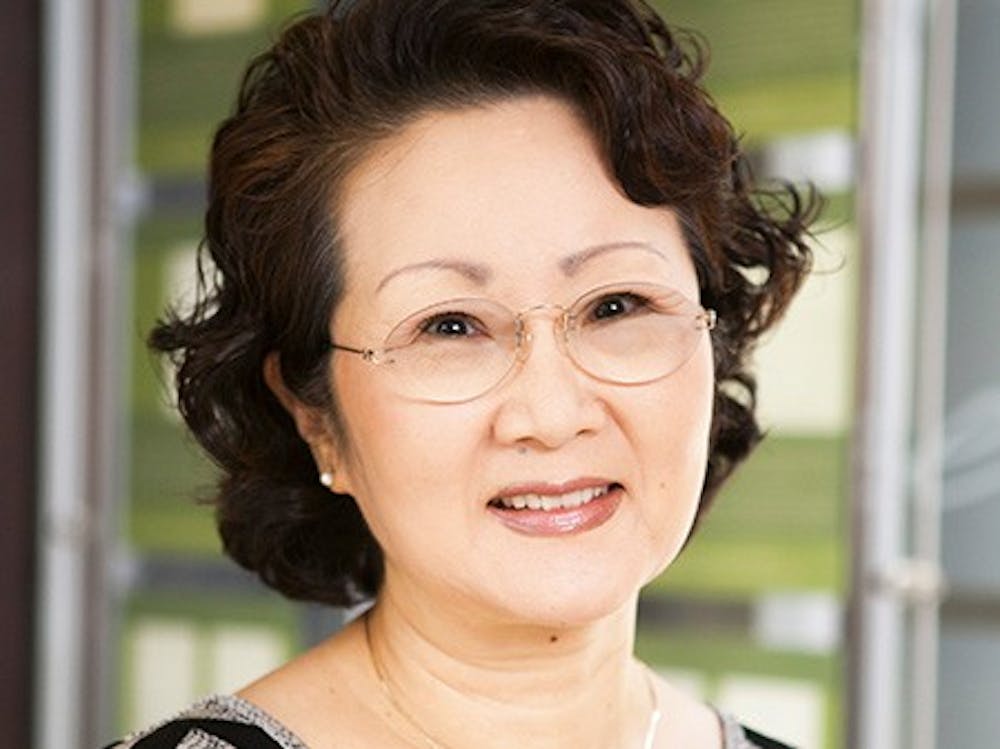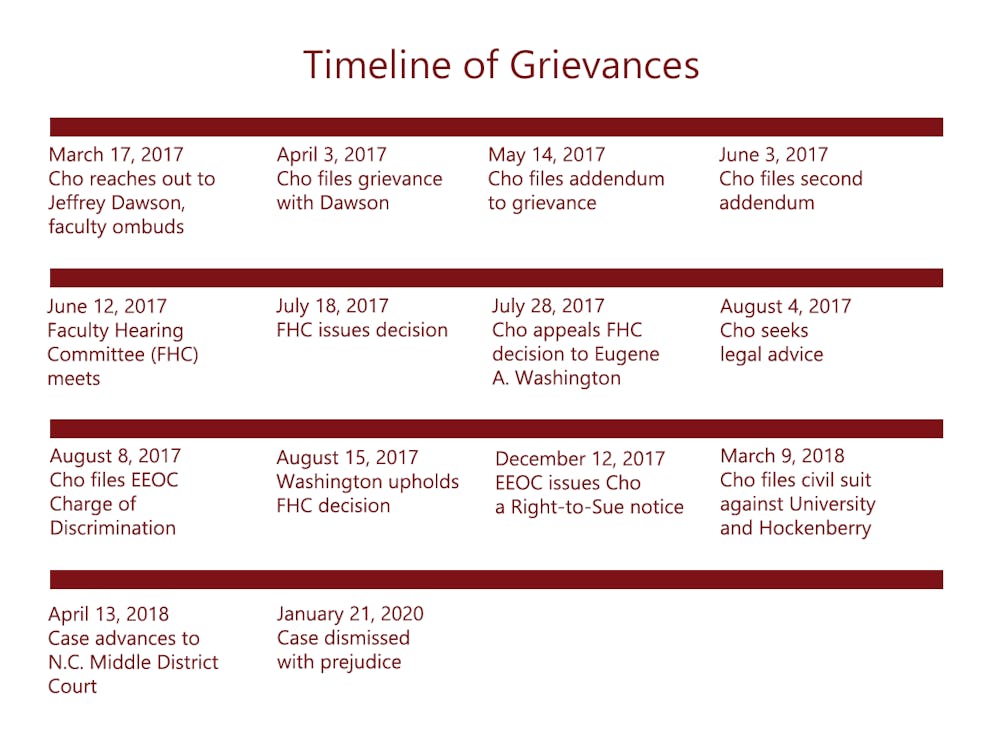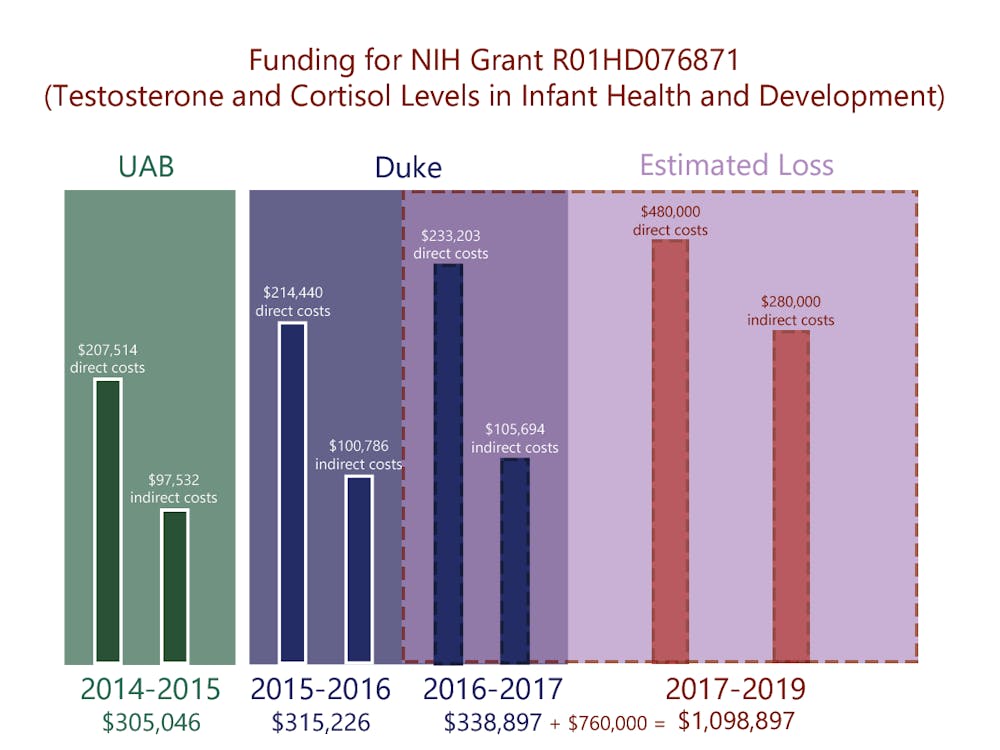Less than a week before Jason Locasale, associate professor of pharmacology and cancer biology, filed suit against Duke for discrimination and retaliation, a federal court dismissed a similar lawsuit by a former associate professor in the School of Nursing.
June Cho filed a lawsuit against the University in March 2018 alleging defamation, discrimination on the basis of national origin and retaliation for filing a grievance against Marilyn Hockenberry, Bessie Baker professor of nursing at the Duke University School of Nursing (DUSON). The lawsuit proceeded to federal court April 2018 and was dismissed Jan. 21 due to a lack of substantial evidence.
Cho filed the charge with the Equal Employment Opportunity Commission five months after filing a grievance within the University. After filing this grievance, Cho claimed that the University retaliated by terminating her National Institutes of Health grant, stripping her of her principal investigator status and not renewing her faculty position. She then filed suit nine months after contacting the EEOC.

Cho, who is from South Korea, arrived at the School of Nursing July 2015 as an associate professor without tenure. She previously worked at the University of Alabama at Birmingham and in 2014, received a five-year research grant from the National Institutes of Health to study testosterone and cortisol levels in infants. This grant, from the NIH subsidiary National Institute of Child Health and Human Development, also helped fund her research at Duke.
Cho reported directly to Hockenberry, who served as associate dean of research affairs at the time, until Cho’s departure from the University. Cho alleged that beginning in early 2016, she was subject to harassment from various actors in the School of Nursing at Hockenberry’s behest.
“Everybody else listed in my complaints were Hockenberry’s ‘running dog,’” Cho wrote in an email to The Chronicle.
Since August 2018, Cho has joined the faculty at the University of Nevada Las Vegas School of Nursing.
Hockenberry; Kimberley Fisher, director of the Neonatal-Perinatal Research Unit in the department of pediatrics; Geeta Swamy, vice dean and associate vice provost of scientific integrity; and Marion Broome, dean of the Nursing School, did not respond to request for comment. Michael Schoenfeld, vice president for public affairs and government relations, wrote in an email to The Chronicle Feb. 17 that he was responding in regard to its “messages.”
“The judge has dismissed the case with prejudice, which means it can’t be refiled by the plaintiff,” Schoenfeld wrote. “The decision is attached, and we will have no further comment.”
What happened?
Cho’s allegations centered around a variety of incidents that she claimed adversely interfered with her research, including internal audits and micromanaging by administrators.
Cho alleged in the ombudsman grievance that Hockenberry and Fisher micromanaged various aspects of her research, including data collection and how much study contributors were paid.
The internal audit of Cho’s research stemmed from concerns that she had violated Duke Institutional Review Board protocol, according to court documents and additional documents provided by Cho. In 2016, Cho re-opened enrollment for her research study at the University of Alabama at Birmingham (UAB) after enrollment numbers declined at Duke. She cited a pre-existing agreement between Duke and UAB allowing collaboration on the project, which originally started at UAB in 2014, but administrators responded that a data transfer agreement needed to be on file at Duke and that the decision was made without their knowledge.
Other concerns were primarily about Cho’s research protocol, such as taking saliva samples from infants, conducting home visits without IRB approval and videotaping interactions between mothers and infants. A total of seven events were reported to the IRB during the course of the study according to the EEOC charge and other documents provided by Cho.
The IRB eventually determined that Cho had deviated from protocol but did not warrant discipline, after which the School of Nursing decided to conduct an independent review, according to the memorandum opinion. Cho’s study was halted Nov. 15, 2016, and the independent audit took place Dec. 7-12, 2016, with a closed meeting occurring in February 2017.
On March 14, 2017, Cho received notice from the Duke IRB that the reported incidents did not constitute an “Unanticipated Problem Involving Risk to Subjects or Others.” To Cho, this was evidence that Hockenberry had purposefully interfered with her research.
“Why had [Hockenberry] then invited the audit?” she wrote in the EEOC charge. “Because she knows that no research project can move forward during an audit.”
Cho also alleged that other faculty members informed her about defamatory comments made by Hockenberry, including that Cho was violent and difficult to communicate with.
Get The Chronicle straight to your inbox
Sign up for our weekly newsletter. Cancel at any time.
After receiving the notice from the IRB, Cho met with Barbara Turner, Elizabeth P. Hanes professor of nursing, and expressed a desire to file a complaint against Hockenberry. Turner then directed Cho to the ombudsman, the memorandum stated.
Building a case
Cho filed a complaint with the ombudsman against Hockenberry and Fisher April 3, 2017. At the time that she wrote the complaint, Cho’s research study was still inactive.
The complaint cited violation of academic freedom, violation of academic due process and conspiratorial harassment as described in Appendix N of the Faculty Handbook, which describes the process of resolving allegations by faculty and staff.
Cho alleged in her addendum to her complaint by ombudsman Jeffrey Dawson that she received a letter dated April 6, 2017 notifying her that her position in the School of Nursing would not be renewed. She declined to sign the non-renewal letter due to her outstanding grievance.
Dawson informed Cho that the renewal decision had been made in January, but she expressed concern that she was not notified of the decision at her performance review in March or in June, when most DUSON faculty members are notified of non-renewal, she wrote.
“The only conclusion I can make is that it was once again a form of retaliation and vengeance against my bringing Marilyn Hockenberry to the University Faculty Hearing Committee,” Cho wrote in an addendum to her ombudsman complaint filed May 14, 2017.

Cho was offered a $27,000 severance if she departed the University within three months, according to the memorandum, but she declined and remained on faculty until June 2018. Cho was later notified by the Duke IRB that her principal investigator status had been terminated on May 9, 2017.
Dawson conducted an independent review of Cho’s personnel file to determine whether her non-renewal was retaliation for seeking support, but he found that the decision was made prior to their first contact, according to the FHC report. However, Cho annotated the report with a rebuttal stating that Dawson could not find evidence of the decision being made in January.
She maintained in the EEOC charge that Dawson was “misled” by the University.
Cho discovered May 30, 2017 that her research grant was being terminated early, according to the EEOC charge. Although the fiscal year ended that month, the grant terminated in July to allow sufficient time to end the project. The project was initially slated for completion by May 2019.
Cho emailed Frances Petti, a grant manager at the the Eunice Kennedy Shriver National Institute of Child Health and Human Development (NICHD) of the NIH, asking her to defer the termination until it could be discussed with Lisa Freund, the program officer at the NICHD who supervised the research grant.
Petti responded that the University had the authority to terminate the grant without feedback from Cho or Freund. The NIH took action regarding the request to terminate Cho’s research grant June 22, 2017.
Cho wrote a second addendum to her complaint on June 3 outlining her communications with Petti and expressing frustration about the situation.
“I naively thought that my grievance against DUSON administrators can be resolved within the University but I was deadly wrong,” she wrote.
The Faculty Hearing Committee convened June 12, 2017 to discuss the case. Six days later, the committee declared that there was no wrongdoing and that Cho used the word “harassment” to describe “general mistreatment by administrators that she found detrimental to her research.”
“In our opinion, a finding of impermissible harassment as set forth in Appendix N would require more than evidence of annoying or bothersome behavior as directed by a faculty member,” the committee wrote. They also stated that the respondents took legitimate steps to oversee Cho’s research project. Cho did not dispute this but instead argued that this authority was abused.
Cho filed an appeal of the committee’s decision with Chancellor of Health Affairs A. Eugene Washington July 28, 2017, and Washington upheld the committee’s findings Aug. 15. 2017.
Escalation
On Aug. 8, 2017, Cho filed a charge with the EEOC alleging discrimination on the basis of national origin and retaliation. Within the charge, she detailed the allegations that she submitted to the FHC as well as a description of how the proceedings negatively impacted her research.
Cho wrote that since the five-year grant was being terminated with two years remaining, there would be an estimated loss of $480,000 for research and $280,000 in indirect costs.
“If we include the non-productive Year 3 at DUSON, the effective total loss will be slightly over $1,000,000,” she wrote.
According to the NIH Research Portfolio Online Reporting Tools (RePORT), an estimated $959,159 in total funding was released to Cho for her research, with the third year comprising of $233,203 in direct costs and $105,694 in indirect costs for a total of $338,897. Using this information and the numbers Cho provided in her complaint, the estimated loss would equal approximately $1,098,897.
The Chronicle filed a Freedom of Information Act (FOIA) request with the NICHD Feb. 5 to verify exactly how much of the grant remained when it was terminated, but this request was still unfulfilled as of Feb. 24.

In addition to the financial loss, Cho expressed concerns about not being able to acquire funds from the NIH in the future. (Her current research project at UNLV requested funding from the Nevada IDEA Network of Biomedical Research Excellence (INBRE), which is funded by the NIH but managed at the regional level.)
While Hockenberry and Fisher were the primary respondents in the grievance filed with the Faculty Hearing Committee, Swamy was a named respondent in the EEOC charge in addition to Hockenberry. She was named in the complaint because Cho’s principal investigator status was removed at the former’s recommendation.
Cho’s demands included the dismissal of Hockenberry from her position, a public apology from Swamy, the restoration of her principal investigator status and the renewal of her appointment as a professor. She requested that a research grant of $720,000 for the next three years be made available at Duke or another institution and that Duke pay all legal fees incurred.
She also requested that $25,000 in funds from her discretionary account be returned to her, alleging that administrators in the School of Nursing said she could not use the funds to conduct research due to her lost principal investigator status.
“I just want to clear my name in our small but well-defined professional society and re-establish some sense of justice for me as well as others at DUSON,” Cho wrote.
The EEOC responded to Cho’s complaint Dec. 12, 2017 with a right-to-sue notice, informing her that she would have 90 days to sue. Cho officially filed suit against the University and Hockenberry March 9, 2018. A petition was filed to remove the case from Guilford County Superior Court and send it to the North Carolina Middle District Court on April 13, 2018.
While Cho’s initial grievances did not provide much detail about national origin, the referral to federal court mentioned reduced communications with and increased criticism of Korean-born employees in comparison to employees who were born in the United States of America. Additionally, it alleged “compensatory damage” to Cho’s professional reputation and a loss of over $25,000 in wages.
This was the beginning of nearly two years of legal proceedings to determine whether Cho had been subject to unjust harassment.
Legal proceedings
On the morning of Jan. 11, 2019, the deposition for Cho’s lawsuit against the University and Hockenberry began.
When Lehman asked if Hockenberry had made comments about Cho’s national origin, Cho responded, “Those kind of thing we have to be very careful of, but you can feel it, because I could never native tongue.”
This was not the first time Cho had expressed concerns about her English communication skills creating a barrier in the workplace. In her EEOC charge, Cho wrote that her speaking skills often worsened in the face of perceived criticism. However, administrators in the School of Nursing maintained that their conflict with Cho had nothing to do with her identity.
“I believe that Dr. Cho is a difficult person to communicate with, but that has nothing whatsoever to do with her national origin,” Fisher wrote in her declaration to the court filed May 13, 2019. “The difficulty stems from her attitude and lack of respect for those who were trying to help her.”
During her deposition, Cho also affirmed that she would have appreciated having a discussion with Hockenberry about what went wrong. She did not go to Human Resources because she viewed the conflict as an “in-house problem.”
The defendants filed a motion for the case to be dismissed April 2019, but legal proceedings continued through the end of the year.
The lawsuit was officially dismissed Jan. 21, 2020 on the grounds that Cho did not provide sufficient evidence for her discrimination claim. Additionally, the majority of the evidence that Cho provided against Hockenberry was deemed inadmissible in court due to its being hearsay.
“Dr. Cho’s own testimony demonstrates that she did not complain of national origin discrimination until after the acts she contends were retaliatory,” the memorandum opinion stated.
The court also determined that since Cho reported to Hockenberry, the latter was not external to the former’s contract with the University and therefore could not have interfered with it.
Cho notified The Chronicle Feb. 16 that there would not be an appeal.
Editor's Note: An earlier version of the timeline graphic incorrectly stated that the complaint was "dismissed without prejudice" when it should have been "dismissed with prejudice." The Chronicle regrets the error.

Nadia Bey, Trinity '23, was managing editor for The Chronicle's 117th volume and digital strategy director for Volume 118.

